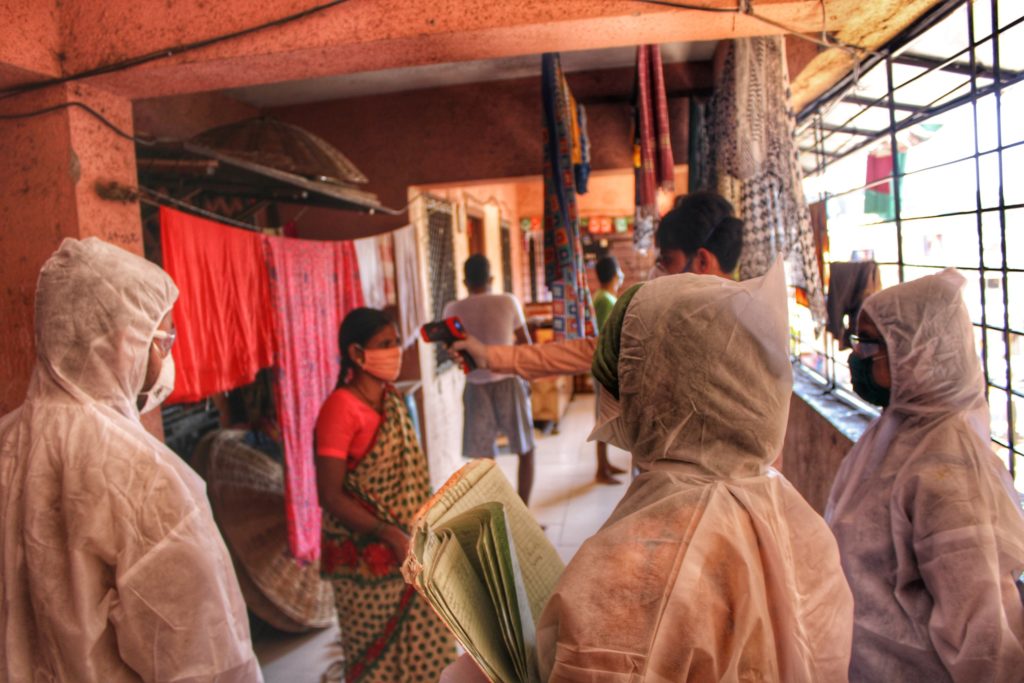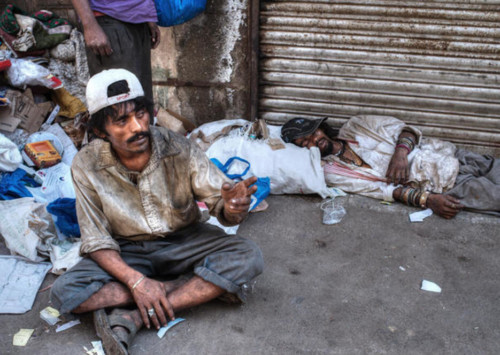How Doctors For You joined the battle against Covid-19 in Mumbai

Community health visitors in Kherwadi, Mumbai, measuring temperature of a resident (MIG photos/ Varsha Singh)
As India marked National Doctors Day on Wednesday, Dr Vaishali Venu, a practising doctor and director, health & nutrition, Doctors For You, an NGO, recounts the life during the pandemic.
Lockdown has been eased a little in Mumbai. After over three months, there are no police on the road, while a lot of people are outside. After the first rains, the temperature seems pleasant. Within two days of the easing, vendors have started their iconic Vada Pav stalls.
But it is scary that nearly one fifth of the people on the streets are without masks. I think people are getting casual about it. The testing is still very limited as only very few get tested and that too only if they show symptoms. Many isolation wards have vacant beds. We have started living with Covid-19 now.
Our organisation, Doctors For You (DFY), is a pan India humanitarian organisation with expertise in working in disaster-hit zones. DFY focuses on providing medical care to the vulnerable communities during crisis and non-crisis situation, emergency medical aid to people affected by a natural disaster, conflicts and epidemics.
Before Mumbai went into lockdown on March 22, the DFY team was continuously following Covid-19 updates from other countries. Given the team’s experience of working in Mumbai’s M ward, an area where Human Development Index is lowest in the country even on regular days, we were sure that if Covid-19 enters a densely populated city like Mumbai, things could go out of hand.
Many key health indicators such as maternal mortality, child mortality rate, child nutrition or the immunisation rate are amongst the worst in the areas where we work. We were continuously in touch with the officials of the Municipal Corporation of Greater Mumbai (MCGM) and we were keen to partner with the government in the battle against the pandemic so that we could fill the gaps. We didn’t want to go out individually and start from scratch.
We kept in touch with them to understand the need. And then we tried to do interventions as per their need. Every day we met the officials asking if there is anything else that they want help on. We used to give them a list of things that we are supporting other hospitals with and keep them updated of our work.
Transportation was a big challenge for the DFY team in the initial days. The team had only three vehicles which were used to ferry staff from their homes to office and back in addition to critical medical work during the day.
Initially, the staff was scared. There was a lot of resistance from families of the staff and the volunteers. Every day in the news, their families heard about deaths. One of our staff also tested positive for Covid-19 and after this incident, nearly 80 pc of the staff refused to work. It took a fair bit of counselling to convince them that there was an equal risk of infection even if they did not come to work as they could get from anyone in their area or when they step out to buy groceries. I think they were also worried about losing their income that their families desperately needed as many of our staff are from poor areas and many people around them had already lost their jobs. So, at the end all our staff was back at work and they worked with their heart during the last three months.
Over the last three months, the DFY team has been engaged in several critical activities aimed at supporting the government’s Covid-19 relief efforts and spreading awareness in affected communities. The team set up isolation wards with 100 beds each in M East ward and H ward, enabled screening and contact tracing, trained health workers, and also supported in transporting Covid-19 patients to government hospitals. To ensure that people in the communities were aware of the nature of pandemic and ways to protect, the DFY team organised an ambulance where medical workers gave tips on Covid-19 preventive measures using audio-visual tools at over 80 locations in Mumbai.
Those who were part of essential services, like the traffic policemen, faced the risk of contracting the infection, so we distributed soaps, masks, and towels at all police stations.
To protect health care professionals who were continuously exposed to infection, DFY launched the ‘Protect the Protectors’ programme. Under this programme, many MCGM hospitals are being supported with PPE kits for their staff.
One of the key concerns for DFY was the state of Primary Health Care (PHC) in communities and the need to provide medication to non-Covid-19 patients. Unfortunately, there were restrictions on starting PHC as the state government was afraid that opening clinics was risky and would spread the infection further.
So, we could start PHC only after April 15. There was so much need that they used to come running to me to ask when I was going to start the clinic. Eventually, we requested the government and told them that we would follow all protocols. If someone has a stomachache or low sugar, as a layman they don’t know what to do.
On regular days, DFY had kept its Out Patient Department open for six hours, but during the lockdown, we were forced to limit it to only two hours per day. The team has now started organising online or tele-consultations between patients and doctors at DFY centres, but feels that there is a need for a system where everyone can get consultation without coming to the centre.
The threat posed by Covid-19 is still not over in India and Mumbai remains as one of the severely affected regions. According to DFY, it will require a lot of effort and more coordination to ensure that there are no deaths caused indirectly due to Covid-19 lockdowns. One of the suggestions by the DFY team is to create a database of TB patients and to start treating them immediately. Many TB patients have been unable to access medication during the lockdown. In addition to this, immunisation and malnutrition is also an area that would require immediate attention.
Society’s reactions make us feel ours is a thankless job
There were many staff who were in quarantine and were tested Covid-19 positive, but the way society treated them was not right. In the colony where I moved to after my marriage, people kept asking about my whereabouts and whether I was working in Covid-19 affected areas. Many stopped even talking to other people living on the same floor as I, assuming that I may be infected and they could also get the illness.The behaviour of the society was disheartening. I got married in December last year, and since the lockdown in March, I can visit my partner only once a week. I usually reach Saturday late in the night and leave by Monday early morning to avoid any needless probing. For the rest of the week, I am either living at the hospital or with my mother.
Fortunately, I am a doctor, and my family can be assertive with the society members when pressured. But the nursing assistants who help me, and who live in chawls, are not able to assert themselves in the same way. They have very little means and in many cases are the sole earning members of their family.
In one such case, our staff fainted during a field activity. We later came to know that some members of her extended family had lost their jobs and were entirely dependent on her. There was less food for everyone now and as a result our team member had not been eating well. Our team helped her after getting to know her situation. In another case, one of our doctors tested positive for Covid-19. Some people made a video of this doctor and circulated it in a WhatsApp group of the housing society where the doctor lived and began blaming the doctor for endangering other people’s lives in society.
We have been putting our professional responsibilities before our personal lives, and despite this, when we are faced with this kind of discrimination, it is very disheartening. It is not like Covid-19 is in our houses. It is in the community, and we are helping because society needs us. If medical professionals don’t do their job now, the situation will worsen for the entire society.
—The author is the director, health & nutrition, Doctors For You (DFY)











